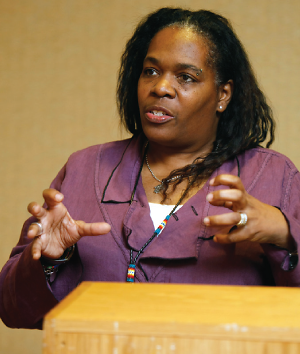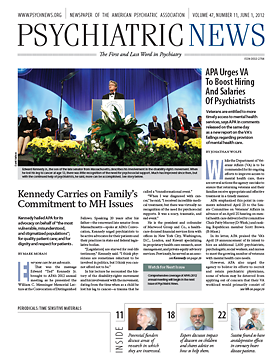For Keris Myrick, M.S., M.B.A., several pivotal moments leading up to her recovery from serious mental illness will remain forever crystallized in her memory: her psychiatrist sitting with her on the floor during one hospitalization, a therapist agreeing to a game of “Chutes and Ladders” during a session, and the realization that she needed to be in charge of her life.
Today, she credits her recovery to a strong therapeutic alliance with her psychiatrist, the steadfast support of family and friends, and a busy schedule as the chief executive of Project Return Peer Support Network, a nonprofit organization in the Los Angeles area. She also jets across the country routinely to fulfill duties associated with roles as the first vice president of the National Alliance on Mental Illness and as a consultant to projects of APA’s Office of Minority and National Affairs (OMNA).
“My mind needs to be busy,” Myrick told Psychiatric News. “If I’m not analyzing some kind of problem, or if I’m not challenged, there is too much room for other things to get in.”
Myrick is nothing if not busy as she oversees nearly 100 advisors—also people in recovery from mental illness—who provide peer-support services to “consumers” in Los Angeles County. The peers assist with symptom management, provide a “warm line” for those in distress, and help them navigate the mental health system. “Although managing a high-level job seems to be the key to mental health for me,” Myrick said, “I have to be careful that my stress levels don’t get too high.”
Myrick is also a member of the selection committee of the APA/SAMHSA Minority Fellowship and offers assistance with the psychiatry component of the Recovery to Practice project, a SAMHSA-funded collaborative effort between APA and the American Association of Community Psychiatrists.
As the daughter of an Army colonel, Myrick grew up in places as far flung as Seoul, South Korea; Ft. Leavenworth, Kan.; and Bremerhaven, West Germany, and was never in one place for more than a few years. As an African American living in Europe and Asia, she didn’t fit in with her peers. When her family returned to the United States to live in a predominantly African-American community in New Jersey, Myrick explained, she also felt like an outcast. “I thought it would be a good experience because it would be one place I wouldn’t stick out, but being an African American, there are expectations about how you will talk and look, and I didn’t meet any of those expectations,” she noted. “My peers made fun of me because I was different from them, and it was very difficult.”
Myrick said her alienation from her peers became more pronounced as she began experiencing early signs of what would years later be diagnosed as schizoaffective disorder and obsessive-compulsive disorder.
She recalled a trip to the grocery store in her early 20s that should have been effortless and routine. For Myrick, however, it was a nightmare of epic proportions as she strolled down the cereal aisle looking for a box of Cheerios. “When I grabbed the box, voices began telling me that it was poison and that it would kill me.” With each successive box she chose, the same thing happened—it didn’t matter what brand of cereal she chose. When a cleanup was announced in her aisle, she looked behind her and noticed piles of boxes cluttering the floor. “This was a really sad moment for me because I realized that I couldn’t do something completely mundane that everyone else can do.” Myrick didn’t tell anyone about the incident at the time and was later diagnosed with an eating disorder, because the voices often forbade her to eat anything and she became dangerously thin.
Although her family was always supportive of her, they didn’t know the truth about the symptoms behind her weight loss. “I never told anyone that I was hearing voices,” due to the stigma associated with psychosis, she remarked.
It was only when she forged a trusting relationship with her psychologist and then with her psychiatrist that the truth emerged, Myrick said.
While seeing a therapist who also worked with children, Myrick noticed a game of “Chutes and Ladders” in his office. Therapy felt contrived up to that point, she said, but there was something about the game that enabled her to let down her barriers during the sessions.
During one of several hospitalizations, Myrick met a psychiatrist who also gained her trust over time. Timothy Pylko, M.D., “made the effort to get to know me as a person instead of just asking me about my symptoms,” she said. When in a catatonic state during one hospitalization, Pylko sat next to Myrick on the closet floor, where she laid. “All I could think about was that his nice suit must be getting so dirty,” she said. Over time, she noted, the two worked as partners to solve the riddles of her illness, including researching treatments together.
Her work at Project Return Peer Support Network, which she joined in 2008, is part of that treatment, as is her work with OMNA, in which she helps train primary care physicians to understand the mental health needs of African-American patients as part of the In Living Color project.
OMNA Director Annelle Primm, M.D., M.P.H, appreciates Myrick’s perspective. “Keris is a premier voice among leaders and advocates working to advance the delivery of recovery-oriented services for people with mental illness and substance use disorders,” Primm told
Psychiatric News. “Her knowledge, experience, and eloquence in articulating how psychiatrists and other mental health practitioners can provide more recovery-oriented, culturally competent care have made her an invaluable collaborator.”

More information about Project Return Peer Support Network is posted at www.prpsn.org. 
